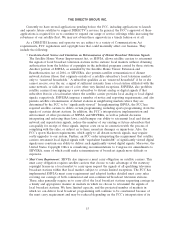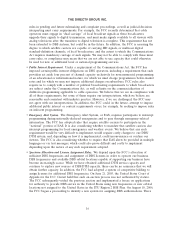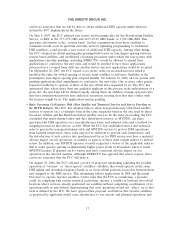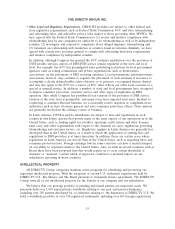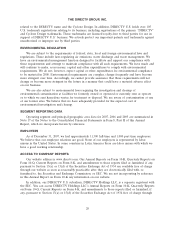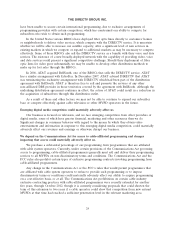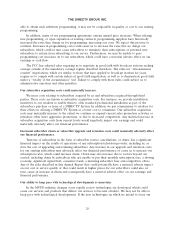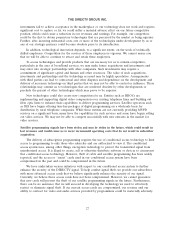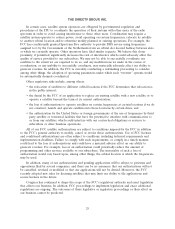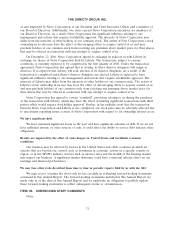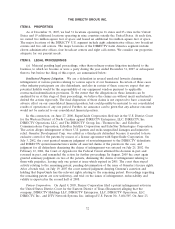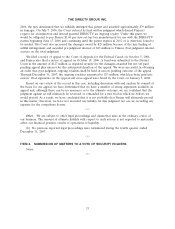DIRECTV 2007 Annual Report Download - page 34
Download and view the complete annual report
Please find page 34 of the 2007 DIRECTV annual report below. You can navigate through the pages in the report by either clicking on the pages listed below, or by using the keyword search tool below to find specific information within the annual report.THE DIRECTV GROUP, INC.
In addition, certain cable providers have denied us and other MVPDs access to a limited number
of channels created by programmers with which the cable providers are affiliated. The cable providers
have asserted that they are not required to provide such programming due to the manner in which that
programming is distributed, which they argue is not covered by the program access provisions of the
Communications Act. Challenges to this interpretation of the Communications Act have not been
successful, and we may continue to be precluded from obtaining such programming, which in turn
could materially adversely affect our ability to compete in regions serviced by those cable providers.
Although the FCC recently addressed some of these issues in a limited fashion by placing access
conditions on certain regional sports networks affiliated with Time Warner Cable, Inc. and Comcast
Corporation, it is not clear that such provisions will be sufficient to assure our continued access to this
programming on fair and nondiscriminatory terms.
Carriage requirements may negatively affect our ability to deliver local broadcast stations, as well as
other aspects of our business.
The FCC’s interpretation, implementation and enforcement of provisions of SHVIA and
SHVERA, as well as judicial decisions interpreting and enforcing these laws, could hamper our ability
to retransmit distant network and superstation signals, reduce the number of our existing or future
subscribers that can qualify for receipt of these signals, impose costs on us in connection with the
process of complying with the rules, or subject us to fines, monetary damages or injunctions. In
implementing SHVIA, the FCC has required satellite carriers to delete certain programming, including
sports programming, from the signals of certain distant stations. Compliance with those FCC
requirements may require costly upgrades to our broadcast system. Further, a recent FCC order
interpreting the requirement that satellite carriers retransmit local digital signals with ‘‘equivalent
bandwidth’’ of significantly viewed digital signals may constrain our ability to deliver such significantly
viewed digital signals.
We have limited capacity, and the projected number of markets in which we can deliver local
broadcast programming will continue to be constrained because of the must carry requirement and may
be reduced depending on the FCC’s interpretation of its rules in pending and future rulemaking and
complaint proceedings, as well as judicial decisions interpreting must carry requirements. We may not
be able to comply with these must carry rules, or compliance may mean that we are not able to use
capacity that could otherwise be used for new or additional local or national programming services. In
addition, the FCC has begun to consider an obligation for carriage of local digital broadcast
transmissions after the digital television transition currently scheduled for February 17, 2009. If the
FCC were to require us to carry all local signals in HD format wherever we carry any local signals in
HD format as of that date, we would be unable to comply in many markets where we currently carry
such signals without ceasing HD local service entirely in such markets, and would be precluded from
launching additional markets currently planned for later this year.
We depend on others to produce programming and programming costs are increasing.
We depend on third parties to provide us with programming services, including third parties who
are our affiliates and third parties controlled by competitors. Our ability to compete successfully will
depend on our ability to continue to obtain desirable programming and deliver it to our subscribers at
competitive prices. Our programming agreements generally have remaining terms ranging from less
than one to up to ten years and contain various renewal and cancellation provisions. We may not be
able to renew these agreements on favorable terms, or at all, or these agreements may be cancelled
prior to expiration of their original terms. If we are unable to renew any of these agreements or the
other parties cancel the agreements, we may not be able to obtain substitute programming, or if we are
25


